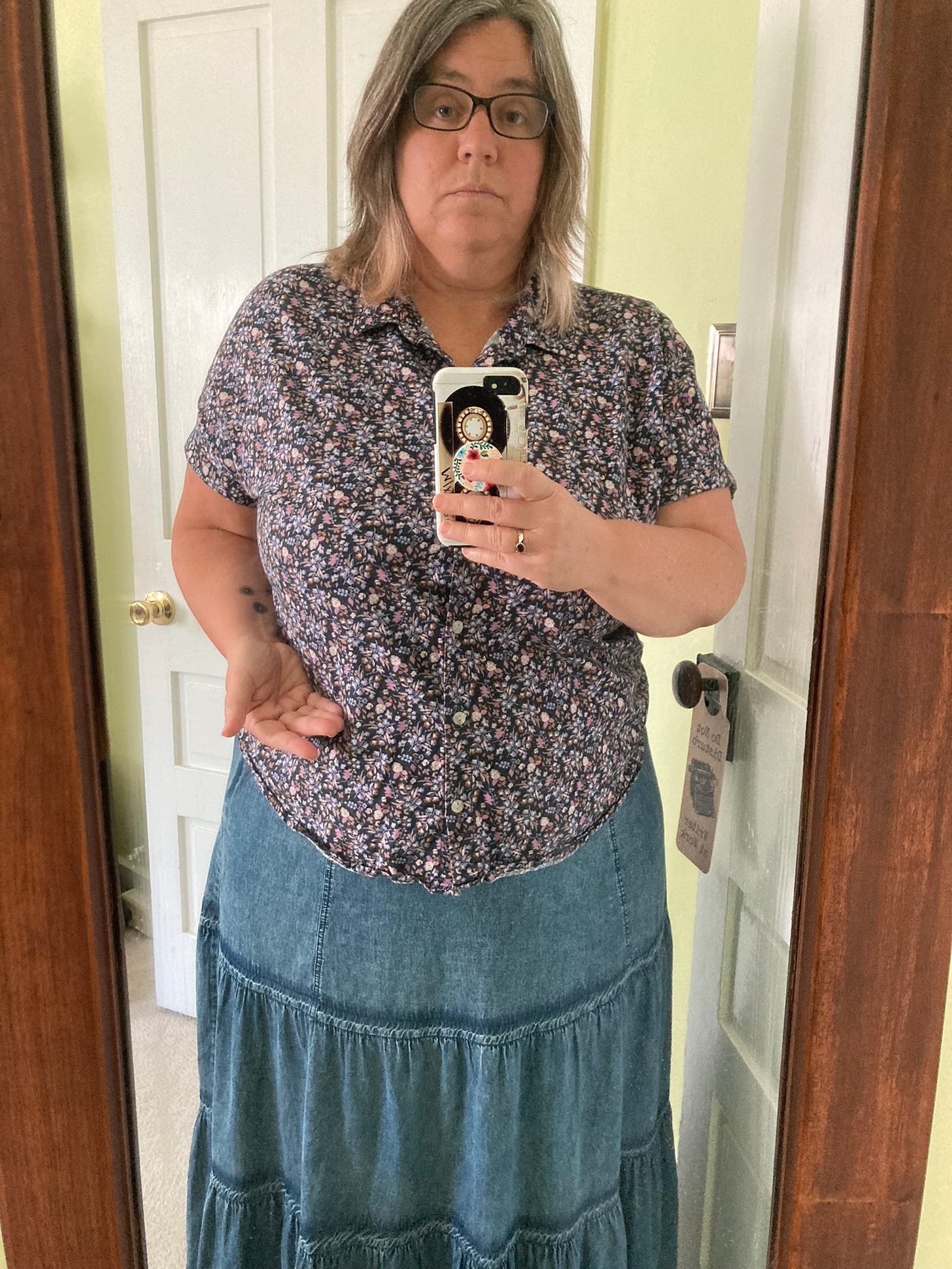I wrote a few weeks ago about getting rid of stuff and then showed off the big trash bag full of clothes headed to the Goodwill. That first round of closet purging was like triage, picking the low-hanging fruit. Clearly, that dress I bought ten years ago is never going to be worn (and probably doesn’t fit). Out it goes!
After that first round comes a slower process of closet sorting. It’s slower because, let’s be honest, clothes are more than just clothes.1
Take this collared shirt. I don’t remember where I bought it or even how long ago. I used to be a big collared shirt type of person, especially in the summer. My closet was full of short-sleeve, button-up collared shirts. Then something changed and I don’t really know what.
I’m not going to pretend that collared shirts went out of fashion and that’s why I stopped wearing them. I teach college students, so I’m not completely oblivious to the latest fashion trend, but that doesn’t mean I’m likely to be following it, especially not if it looks the least bit uncomfortable. Maybe I stopped wearing collared shirts because I put on weight and there’s nothing more annoying than a button-up shirt that gaps open because your boobs are too big.
Maybe I just got tired of wearing collared shirts. A friend (but were they a friend?) called me fickle once. It wasn’t a compliment. Fickle, as in, I get tired of a thing quickly and switch to something else. I wear my hair long for a while and then I’m over it and I cut it all off. In addition to collared shirts, I went through a long maxi-skirt period, so much so that I remember my niece saying to me, “You never wear pants.” She wasn’t wrong.
So when I pull out that last, remaining collared shirt, it’s about more than just an item of clothing. It’s about who I am. Am I fickle, unable to commit to this shirt for a lifetime, let alone five years?2 Am I still the kind of person who wears collared shirts? Am I the kind of person who would wear this particular shirt?
The sociologist Georg Simmel wrote about fashion back in the 19th century as an example of duality, his central concept for understanding the relationship between society and the individual.3 We use fashion to differentiate ourselves as individuals. I am different from everyone else because I wear collared shirts. Or because I don’t. It really doesn’t matter either way.
But my attempt to stand out and be different is a form of conformity to a different group—those who follow fashion or those who defy fashion. Or maybe I’m conforming to middle-age mom style. Or middle-age professor style. That doesn’t matter, either. My attempts to be different are always just a form of conformity to a slightly different group.
Say I shaved my hair into a mohawk to express my individuality. Great, but why a mohawk? By getting a mohawk, now I’m conforming to a certain group aesthetic defined as punk. Same thing with a mullet. You may think your mullet is ironic, but really it’s just another form of conformity to a different group (hipster? ironic hipster?).
You can see this especially in high school with cliques. If you wear all black, you’ve differentiated yourself as a goth and are now operating under a different set of fashion rules, but they’re still rules all the same.
Simmel’s larger point isn’t that we’re all lemmings, mindlessly conforming to whatever group we find ourselves belonging to. It’s more that we cannot express our individuality without drawing on the tools of society. Our individuality is, in fact, always collective. It has to be, because otherwise it wouldn’t work. Clothes are a language I use to tell myself and others about who I am. Like a language, it only works if we have a common understanding of what those symbols are and what they mean. If a mohawk has no meaning to you, then I’m not telling you anything.
On the flip side of that coin, the collective is always made up of those individual decisions. Duality—you can’t have one without the other.
A closet is never just a closet. My closet changes as the particular group or aesthetic I’m trying to fit into changes. A collared shirt is always so much more. For now, it’s still there. But tomorrow, who knows?
And as many of you pointed out in your comments on that earlier post, stuff in general is more than just stuff. Stuff that belonged to a loved one who’s no longer alive is more than just stuff.
Just incidentally, why is fickle an insult? If you stay exactly the same person, aren’t you sort of doing something wrong? I’m growing and changing all the time, as well as exploring new things. Nothing bad about that.
More recently, sociologist Tressie McMillan Cottom wrote a great deal about clothes and politics in her New York Times newsletter, here.





The new Free Store at the college would be happy to accept your collared shirt if you wanted to find it a new home. :) Good stuff about how much stuff we seem to accumulate!